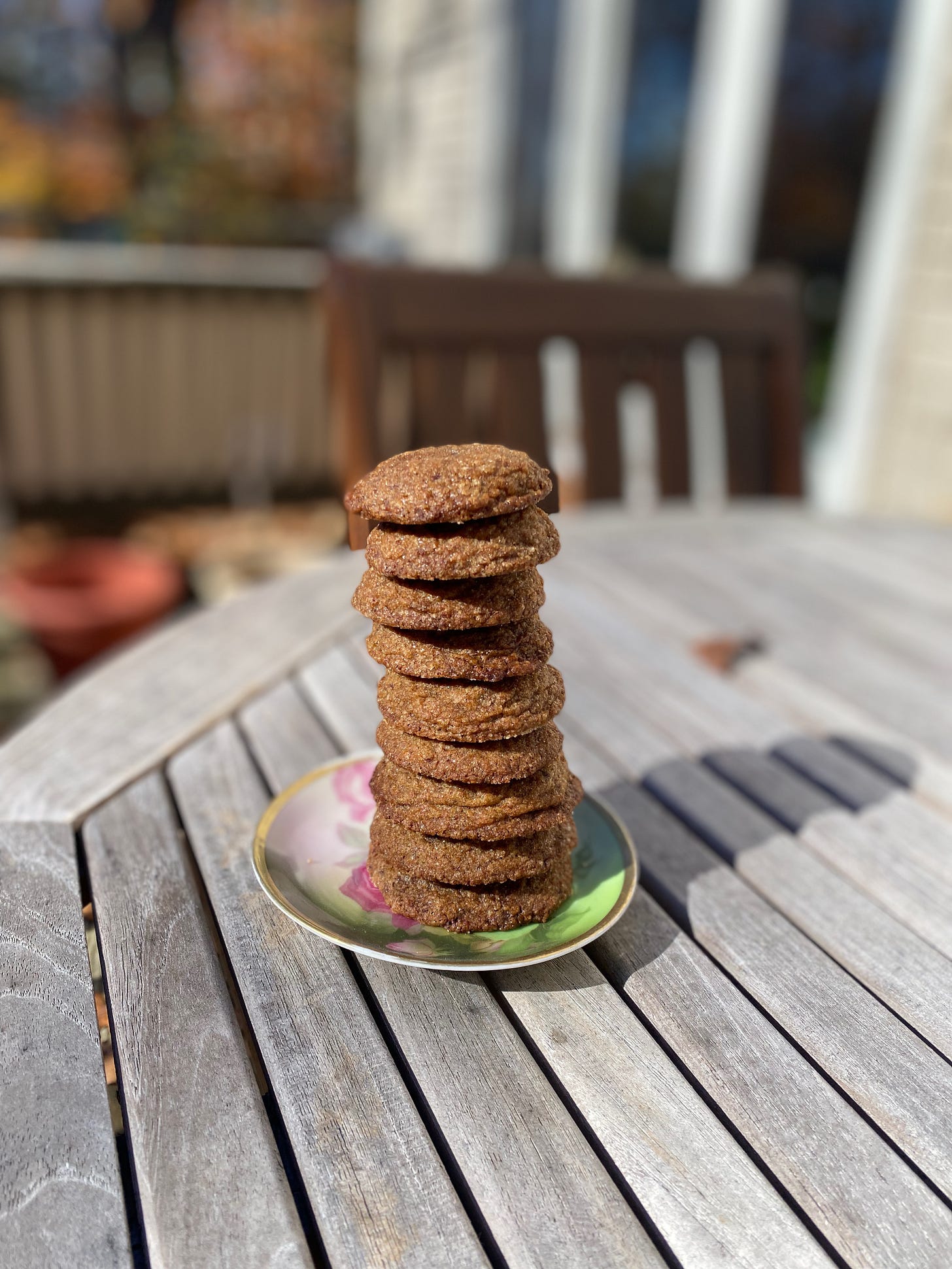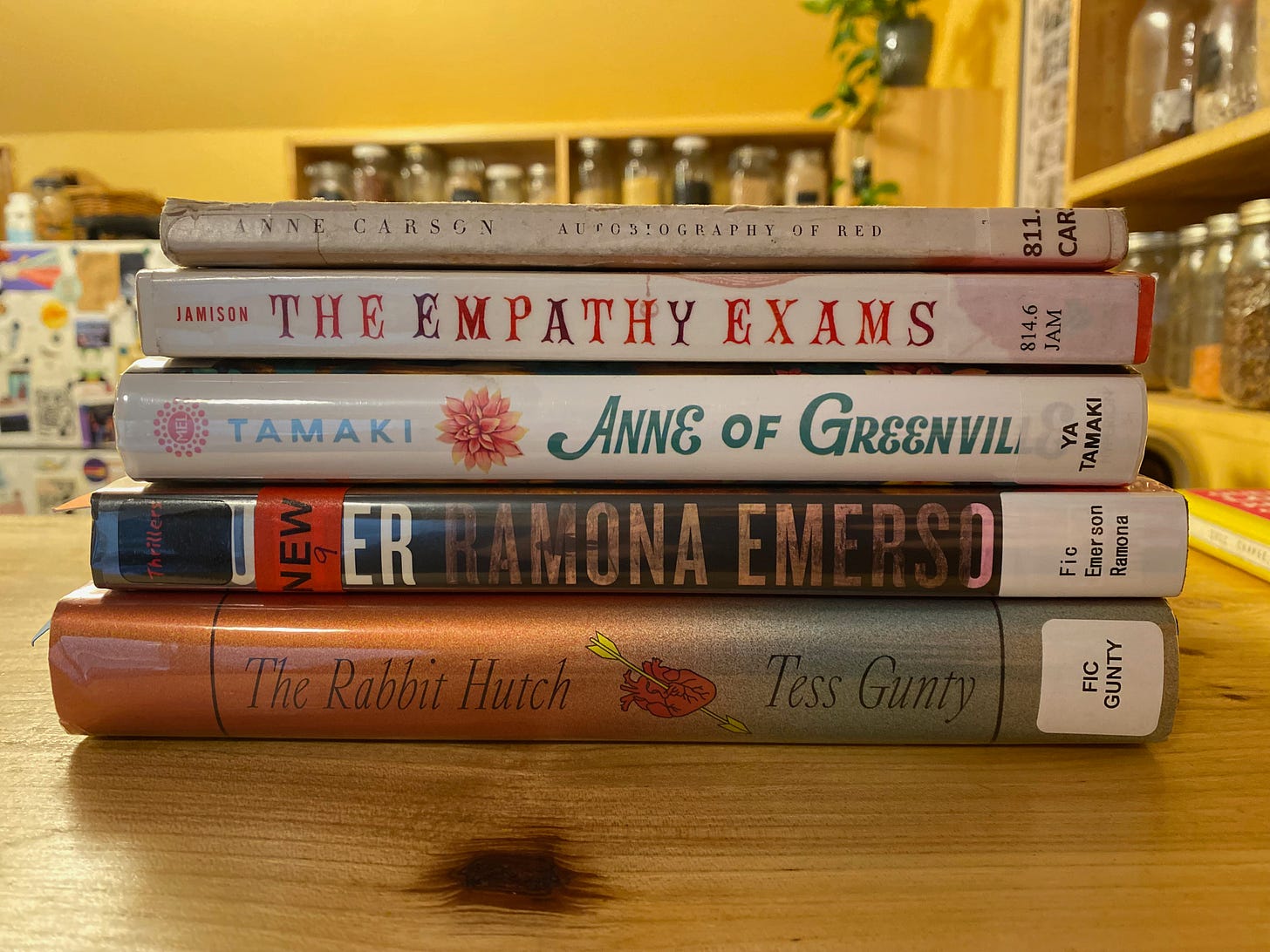Greetings, book and treat people, and welcome to November! It’s my second favorite month. I love it even more than October. I know I’m in the minority here, but I just can’t keep my joy to myself. My mom (who also loves November, her birth month) and I have long been fans of this poem, one of my November favorites. If the coming dark has you down, and you’d like a piece of mail from me to brighten your November days, reply with your address. I will write ebullient postcards!
November aside, I have some very exciting news to share with you today: I’ve just started a brand-new weekly video series, Bookish Teatime! Each week, I’ll be posting a short video about my reading life: what I’ve just finished, what I’m in the middle of, books I liked that didn’t make it into the newsletter, tours of my bookshelves—who knows what else! I’ll also share a bit about a tea I’m enjoying, because you know I love pairing books with foodstuffs.
This week’s video is available to everyone, but starting next week these will only be for paying subscribers. They’ll usually go up on Mondays, but I’ll always link them here.
This is something I’ve been thinking about for a while, and it’s finally a reality. It was definitely terrifying making a video—it’s not my usual medium—but I enjoyed the process and I hope you enjoy the result.
This week’s books have nothing in common except that each one exists in a perfect vessel. Alice Wong’s memoir is a collection of text, images, transcripts, interviews, and other ephemera. It’s a singular archive, a structure that seems to exist solely to receive her storytelling. The Lesbiana’s Guide to Catholic School, on the other hand, has a structure so straightforward you hardly notice it—but, in my opinion, it’s a perfect YA novel: perfect pacing, perfect plot, perfect writing, perfect ending. I love books likes this, books that know exactly what they are and execute whatever they set out to do with flawless assuredness.
The Books
Backlist: Temporary by Hilary Leichter (Fiction, 2020)
This is a strange, sad, funny, beautiful book. It’s absolutely zany, a bizarre odyssey through increasingly strange situations. It sometimes feels like a fable—it’s impossible to believe. Yet it’s also precisely accurate, telling emotional truths with a sharpness that cuts right to the center of things.
The story is about a young woman, a temp worker (or temporary, as she calls herself) who longs for stable, reliable employment—the steadiness, the thing all temporaries aspire to. Her agency assigns her placements, and she goes where she’s told, drifting from job to job, filling in for permanent workers who have quit or left or disappeared. The jobs she takes are not ordinary. She works as a stand-in for the Chairman of the Board of a large corporation, a pirate, a human barnacle, a shoe cleaner, an assassin’s assistant, a mother. She describes all of these placements with a mix of pride, humor, disgust, and resignation. Her matter-of-factness grounds the book. Things are not quite as they seem, but they feel exactly as they seem.
She often reminisces about her childhood, her mother (also a temporary), and the first job she ever had, which she describes like this:
The job was in a lovely little house with a lovely little door. There were more doors inside the house, seven doors precisely, in total. My job was to open the doors, then close them, every forty minutes, every day, all day long, until otherwise notified.
What an apt description of the banality of work, of all the pointless tasks capitalism requires us to preform. There’s so much melancholy in this novel—even when she’s working on a pirate ship—exciting!—she’s merely filling in for someone else. She is, literally, a replacement. Disposable. When her term is up someone else will come along. She can never just be herself; she’s always a facsimile of herself, a character playing a role assigned.
“Maybe the people are all the same people,” she muses at one point. “Maybe I’m my sister and my sister is me, and in this way, living is also a state of mourning.” She moves through the world, seeking and seeking and never finding, the steadiness always just one more placement away, and isn’t that, too, how it feels to be alive?
This book is so entertaining and fun. The narrator has a gaggle of boyfriends, all of whom she assigns names (culinary boyfriend, favorite boyfriend, earnest boyfriend, real estate boyfriend). As she travels farther and farther away from home, seeking work, she checks in with them on the phone, and they become a kind of Greek chorus, a fraying thread connecting her to her old life. These conversations are hilarious, and so are many of the narrator’s descriptions of her jobs. There’s a silly and raucous buoyancy to the narrative.
But alongside this fast-paced odyssey is a poignant story about 21st century workplace culture, loneliness and capitalism, self-worth, the uncertainty of the future, and what it means to learn, over and over again, that the thing you want most is something the system has been purposely designed not to give you. These two kinds of stories work in concert; neither could exist without the other. It’s a brilliant, perfect vessel.
Frontlist #1: The Lesbiana’s Guide to Catholic School by Sonora Reyes (YA Fiction)
I haven’t been reading a ton of YA this year (I just haven’t been in the mood), but a few folks mentioned how good this book was when I was looking for a new audiobook recently, so I went for it. Oh, what an absolute and utter joy! It reminded me just how good YA can be. I listened to it on a long boat ride/drive, and just kept listening to it when I got home because I didn’t want it to end.
It’s about a Mexican American teenager, Yamilet, and her brother, Cesar. They’re both starting over at a new Catholic high school after a disastrous year for both of them at their old school. Yami was outed by her best friend and Cesar was constantly getting into trouble. So Yami is determined to a) make sure no one at her new school finds out she’s gay and b) keep her brother out of trouble. Obviously, things don’t go to plan, because life is really fucking messy and complicated. Yami immediately falls for Bo, one of the few out students in her class, and she soon learns that Cesar wasn’t so much getting into trouble as he was being bullied for being queer.
There is so much going on in this novel, but at heart it’s a book about queer siblings. It’s odd to me that so few reviews mention this, as if the fact that Cesar is queer is a spoiler. Yes, the book is told from Yami’s POV, but Cesar’s story is a part of her story, and the relationship between them is what propels the book forward. Their dynamic is gold. I could read books about queer siblings all day long, and I’m not sure I can adequately capture how well Reyes writes both of these characters. They have such different experiences and relationships—with queerness, with friends at school, with their crushes/sweethearts, with their parents. They care about each other deeply, they look out for each other and protect each other, and yet they also cannot always see each other. They are petty and they bicker and they hurt each other in big and small ways, and they are also fiercely loyal. There’s so much joy in how they interact with each other, and there’s also some deep, old conflict that takes a lot of work for them to untangle.
There’s a romantic plot—Yami falls in love with Bo—but Reyes handles it in my absolute favorite way: it’s not the center of the story. The book is about family, and growing up and into yourself. Yami and Cesar live with their mom; their dad was deported when they were much younger and lives in Mexico. There are so many layers to all of these family relationships, and they don’t all get sorted out at the end of the book. The romance, in comparison, is pretty simple. It’s fun and sweet. It’s a delight to watch Yami open up and get something she so badly wants. But it’s not where any of the tension lies. It’s not where the hard stuff happens.
So this is a queer sibling story and a story about immigration. It’s about homophobia and also how painful the fear of homophobia can be. It’s about finding your people. It’s about race and mental health and cultural identity. Yami is dealing with a whole lot, and it’s all here, and Cesar is dealing with a whole lot, too, and that’s all here, and their mom is dealing with a whole lot, and that’s all here. There is so much going on, but it never feels jumbled or underdeveloped. It’s serious, but it’s also warm and silly and funny. The ending is full of joy, but it’s not neat. This is the best YA novel I’ve read in ages, and I can’t wait to see what Reyes does next.
Frontlist #2: Year of the Tiger by Alice Wong (Memoir)
I’ve been following disabled activist Alice Wong for a while so when I saw she had a memoir coming out I immediately excited. I had no idea what was in store for me. This book is not just a memoir—it’s a guidebook and an archive, a collection of wisdom and jokes, a life story, a reference manual, a portal into the future. It’s an incredible collection of essays, interviews, podcast transcripts, photographs, comics, tweets, letters and emails, graphics, recipes, commissioned art, and puzzles.
I don’t know Alice Wong, and, of course, there’s only so much you can learn about a person from reading their book. No human can be reduced to a story, even if it’s a story they tell themself, and even if it’s a story as varied and complicated as the one in this book. Even so, it’s obvious how much of herself Wong put into these pages. It’s obvious she didn’t flatten or neaten her experiences to make them more palatable for white and non-disabled people.
This book feels alive in a way few memoirs do. It is so funny and so snarky. It is full of serious, insightful essays and interviews about disability justice, ableism, the medical industrial complex and the way it so often fails disabled and chronically ill people. It is also about snacks. And cats. There is a painful, infuriating saga, told in tweets, emails, and photos, of how hard it was for Wong to get a covid vaccine. It is a pointed, searing call-to-action. There is also a full-page graphic that says “stfu white people” in huge letters, and another that says “big pussy power” in all caps. There is an interview between Wong and her mom where they talk about the Lunar New Year and their family’s dumpling-making traditions. There’s an “Exclusive interview with Alice Wong by Alice Wong” in which she makes lots of cat puns, discusses her favorite lipstick colors, and shares her motto: “Fuck the fuckers.” There are recipes for comfort foods. There’s an essay about how crucial plastic straws are for many disabled people, and the ableism inherent in plastic straw bans. There are interviews about access, podcasting, the pandemic, movies, care work, mentorship. There’s a full page spread of illustrations called “Food Heaven”.
I mention all of these things—and there is so much more to this book, the above is just a small sample—because this brilliant, messy, dizzying mix of ideas, memories, and stories is what makes this book sing. Too often, disabled people are shoved into narrow boxes—by our ableist culture, by the media, by publishing. Disability memoirs are supposed to be a certain way. This book dumps all of that where it belongs—into the trash. Wong is fierce and silly. She writes about her childhood, her disability, her life as an activist, her love of food and pop culture. She makes a lot of jokes. She mourns. This book is full of anger and disabled joy. It’s smart and painful and petty and bursting with wisdom. It is not one thing; it’s a kaleidoscope. It gave me so much to think about. Please do yourself a favor and read it.
The Bake
I’ve made this recipe before, but this time I added chopped chocolate, and they become something entirely different. It’s wild! They don’t taste like gingersnaps at all. They’re still gingery and spicy and chewy in the middle. But the chocolate changes everything in an undefinable way—these aren’t gingersnaps + chocolate, they’re something else, something new.
Chocolate Gingersnaps
Adapted from Dorie’s Cookies by Dorie Greenspan
The irregularity of chopped chocolate and the fine chocolate dust that comes from chopping is what makes these cookies so special. If you add chocolate chips instead, you’ll end up with chocolate-studded gingersnap cookies, which I’m sure will be delicious—they just won’t be these.
Ingredients
272 grams (2 cups) all-purpose flour
2 tsp baking soda
1 tsp cinnamon
1 tsp clovers
1 tsp ground ginger
3/4 tsp salt
200 grams (1 cup) sugar
1 1/2 sticks (12 Tbs, 170 grams) unsalted butter, at room temperature, cut into chunks
1/4 cup (60 ml) molasses
3 Tbs. crystallized ginger, finely chopped
1 egg
1 tsp vanilla
100 grams bittersweet chocolate, chopped into small, irregular pieces (you want some the size of chocolate chips and some much smaller, like coarse sand)
In a small bowl, combine the flour, baking soda, spices, and salt.
In the bowl of a food processor, combine the butter, sugar, and molasses. Blend until fully combined. And the crystallized ginger and pulse for a few seconds to incorporate. With the machine running, add the egg and vanilla, and continue mixing until well blended. Scrape down the sides and bottom of bowl. Add the dry ingredients and pulse to combine. When the flour has mostly—but not quite—disappeared, add the chopped chocolate. Pulse a few more times until no streaks of flour remain.
Turn the dough onto a work surface, form it into a ball, wrap in plastic wrap, and refrigerate for 1-2 hours. (Dorie says two hours minimum. I was impatient and baked them after one. They were still delicious.)
Preheat the oven to 350. Line two baking sheets with parchment paper or silicone baking mats. Pour some sugar into a wide bowl. Pinch off small spoonfuls of dough, roll them into balls between your palms, drop them into the sugar, and roll them around until completely coated. Place on the prepared baking sheets about two inches apart.
For soft and chewy cookies, bake 14-15 minutes. For mostly chewy cookies with crisp edges, bake 16-17 minutes. If you just want them chewy in the center, bake 18-19 minutes. However you do it, rotate the pans halfway through baking. Let cool completely on the pans.
The Bowl & The Beat
The Bowl: Quick Fall Sauté with Roasted Potatoes
One of the strategies I use to trick myself into cooking when I don’t feel like it is to buy things that won’t last for a long time and then challenge myself to use them as quickly as possible. That’s how this simple dinner came about: I wanted to use up a big bag of Brussels sprouts. This hearty fall stir-fry fed me for several days!
Slice some fingerling potatoes in half, or cut 2-3 bigger potatoes into chunks. Toss with olive oil, salt, and pepper, and roast at 450 for 20-25 minutes, until golden and crispy.
Meanwhile, heat a big hunk of bacon fat, butter, or olive oil in a skillet. Slice a big pile of Brussels, maybe a pound or a pound and a half. I have been cutting Brussels sprouts like this for about a year now and I will never go back to halving them. Add the Brussels to the pan and cook over medium heat, letting them brown for a few minutes before stirring and letting them brown some more. Slice a bunch of mushrooms (I used about 6 big creminis, use any kind you want) and add them to the pan along with some salt and pepper. Keep cooking until everything is just how you like it, and then dump the potatoes into the pan and give it a few last stirs. Grate some Parmesan over the top.
I ate this with cheesy polenta (1 cup polenta, 4 cups water, cook until thickened, add grated cheese and a hunk of butter) one day and leftover quinoa the next.
The Beat: The Town of Babylon by Alejandro Varela, read by Timothy Andrés Pabon
I’ve always been a rereader, but it’s only in the past few years that I’ve started rereading books only a few months after reading them for the first time. I love this experience so much that whenever I have the opportunity to request audiobooks for review that I’ve already read, I do it. This novel is still fresh in my mind from when I read it in March, so listening to it is an opportunity to delve deeper. I’m picking up on all sorts of things in the writing, the plotting, the characterization, that I missed in my first read. It’s such a pleasure to slow down and be present with a book this way.
The Bookshelf
A Portal
Here are the five library books I currently have checked out: The Autobiography of Red, The Empathy Exams, Anne of Greenville, Shutter, and The Rabbit Hutch.
You know I’m always interested to hear if you’ve read and enjoyed any of these, but I’m also interested in your library habits! Do you also put a million books on hold? How do you manage your holds list? What’s your favorite library you’ve ever been to? Come talk to me in the comments!
A Bookish Quandary
Today I’m answering the second half of this excellent question:
Where do you get all your book information and find all the books you read?
Last week I talked about backlist books. This week I’m tackling upcoming releases.
#1: A few specific internet lists.
Casey, who is fabulous, does quarterly roundups of upcoming queer and feminist books for Autostraddle. And because the folks at Autostraddle are in league to wreck my budget, they create handy month-by-month lists of all those books on Bookshop! This is an incredible resource.
R.O. Kwon’s yearly list of books to read by women of color, which started in 2017, and usually comes out in early January, is another amazing resource. I eagerly await it every January and immediately add approximately 10,000 books to my TBR.
Charlott Schönwetter (who I mentioned last week, she’s a must-follow on bookstagram) posts two yearly most anticipated lists on her blog. I learn about so many interesting small press books from her!
#2: Edelweiss & NetGalley. These are the two sites where publishers upload ARCs for reviewers to request and download. Anyone can make an account, and even if you’re not interested in ARCs, it’s an easy way to stay on top of what’s coming out in the next 6-8 months. I find the category filters lacking (with Edel especially, very few books actually show up under the LGBTQ+ filter), and the sheer amount of books is sometimes overwhelming, but there’s still a wealth of information on both sites.
#3: Bookstagram, again. Specifically, indie presses on bookstagram. Indie presses often share their upcoming catalogues and do cover reveals on bookstagram. They might do this on other social media, too—I wouldn’t know, I stay in my lane. What I can tell you is that I often save posts about upcoming books months before they’re out, when a press first mentions them. Tin House, Counterpoint, Astra House, and Graywolf are all active in this way—you’ll find dozens of upcoming books scrolling through their feeds.
#4: Liberty Hardy. If you want to know about ALL THE BOOKS coming out in any given week, Liberty is your person.
A reminder: bring me your questions! Anything bookish or bake-ish is fair game. The weirder the better! I’m truly excited to answer any and all questions—if you haven’t noticed, I could talk about books and baking all day. Send me your quandaries at queerbooksandbakes@gmail.com, or just hit reply.
Around the Internet
On Book Riot I wrote about how much I hate phrases like “good rep” and “bad rep” and, honestly, the way we talk about representation in general. I also wrote about some of the best books I’ve reread on audio, and why you should reread them that way, too. My review of Ghost Town by Kevin Chen is up on BookPage.
Now Out / Can’t Wait!
Now Out
The Color Pynk: Black Femme Art for Survival by Omise'eke Natasha Tinsley (University of Texas Press): I like to push myself to read challenging and/or academic books sometimes, and this exploration of Black femme art, culture, and poetics sounds fascinating.
The Call-Out by Cat Fitzpatrick (Seven Stories Press): A novel in (rhyming!) verse about a group of queer and trans women living in Brooklyn. Sounds super weird and super gay, I’m in.
Can’t Wait!
The Two Doctors Górski by Isaac Fellman (Tor, November 29th): I loved Fellman’s debut, Dead Collections, so the fact that we’re getting another book from him in the same year? Thrilling!
Bonus Recs: More Perfect Vessels
The Lost Books of the Odyssey by Zachary Mason is an inventive and unusual retelling/reimagining/repurposing. World of Wonders by Aimee Nezhukumatathil is a beautiful blend of science and memoir and wonder that sits perfectly in the shape Nezhukumatathil made for it.
The Boost
This is an absolutely magnificent collection of disability justice tools and resources curated by the team at Creating Freedom Movements. A bit more info about the tool and the folks who made it here.
As always, a little bit of beauty to send you on your way: This is more October beauty than November beauty, but—that glow. Be still my heart.
Catch you next week, bookish friends!










I loved your tea time video! And I also loved that you just named Liberty as a place you get books from—I totally get most of my recommendations from her too! Truly the internet's most knowledgable book person!
I love October and November too! The best months for hiking and walking outside.
And thank you for the shout-out 🤗
I used to go wild on library holds but since I started working at libraries I've had to really rein it in because I just saw books on order and arriving on the shelves every day and I can't read them all! These days I only do holds for physical books if I didn't get a review copy from a publisher and none of my three digital library cards have them available as e-audiobooks. I have to REALLY want to read them to track them down for a hold.